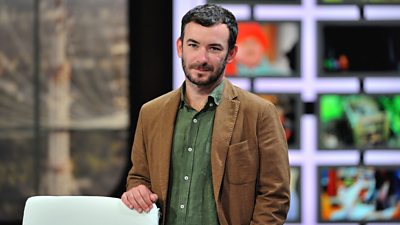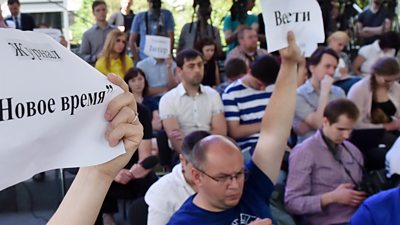How do you turn an old-fashioned, once-state-controlled broadcaster into a public service broadcaster fit for the 21st century?
Yaroslav Lodygin, the head of television at UA:PBC, and the rest of the team are working hard to do just that, transforming the Ukrainian public service broadcaster into a modernised newsroom serving audiences with trusted information across television, radio and digital platforms.
But in a country still experiencing unrest on its eastern and southern edges, and powerful media influence from Russia next door, UA:PBC - now rebranding as Suspilnie (Public) - faces constant challenges from both uncertain funding and a media landscape loaded with mis- and disinformation.
Our role is to give balanced, clear information [to help audiences] to understand the world, to entertain and to communicate.”
Yaroslav told ����ý Media Action, “All our independent monitoring shows that our news products are considered among the clearest, most independent and nonbiased in Ukraine.”
The work began in earnest in 2017, with an overhaul of the formerly state-controlled national radio and television, and regional radio and television networks. At that time, their audience was mainly older people, often listening on old-fashioned ‘wired’ radio popularised in Soviet times, before the existence of FM radio.
Today, with the help of ����ý Media Action and other donors and partners, the broadcaster has restructured its newsrooms, creating two national television channels and two satellite channels, and centralised programming for stronger impact across its 24 regional channels. A nearly-completed, new FM radio network hosts three national radio stations, including the original Ukrainian radio which marked its 96th birthday this year, a modern music-radio station focused on Ukrainian content, and a national cultural radio station with classic and folk music and talk radio.
They have launched a news website, which now has 3.7 million users per month, and the most-viewed Facebook page among Ukrainian news pages.
“The biggest challenge for us is to change the reception and understanding of the role and potential of public broadcasting in Ukraine. It is an absolutely new area, both for the establishment in Ukraine and for the audience. People have never used these kinds of services before. In Soviet times, anything that was public broadcasting meant slow, outdated, not fancy,” he said.

The Soviet era also meant control over content. Among the greatest challenges now is establishing a new understanding of what public broadcasting should be, including what control the state holds over the budget, the role of the government-appointed supervisory board, and how to ensure the independence of editorial content. Then they need to sell their vision of a truly public interest broadcaster to a public more interested in watching flashier, but often biased and less reliable, private networks.
While media is not censored in Ukraine, the influence, beliefs and political leanings of private media owners comes through on their networks, and journalists may self-censor accordingly. These networks are also less likely to invest in information, debate and discussion in the public interest. Many journalists who start out reporting impartial, trusted information will often turn to private networks for a salary boost.
“If you try to be a good journalist in Ukraine, you need to prepare for a poor life,” Yaroslav admits, conceding UA:PBC cannot match commercial salaries and often loses young talent.
Despite its limited budget and uncertain future – financial planning in a country which has faced so much turmoil is limited to one year at a time – UA:PBC has continued to produce important programming about the COVID-19 pandemic, countering much of the misinformation which spreads online.
“We are trying to provide the information and create content that people can rely on and trust. Our research finds that our audience feels they can trust us,” Yaroslav said. After decades of state media control, Ukrainian audiences are used to a critical approach to traditional media. But the Internet, he says, is perceived to be different – separate from biased traditional media, and therefore more reliable. “If you ask them where did you get this ridiculous information, they would say, 'well I read it on the Internet'.”
Although planning ahead is constrained by UA:PBC’s status in the country as a non-profit and uncertain government funding, Yaroslav says the network plans to continue its modernisation and invest next in good children’s content.
“We’ve had a lot of assistance and help from ����ý Media Action. It was absolutely impossible to create a modern studio without their help. We have created the modern look of a public broadcaster. Now we finally have the possibility of changing even the old habits of TV viewers – now they don’t perceive us as outdated. We just need the chance to grow.”
����ý Media Action has worked with UA:PBC on training and newsroom production, funded by the UK's . The UA:PBC newsroom modernisation, funded by the European Union, was conducted in partnership with DW Akademie.


